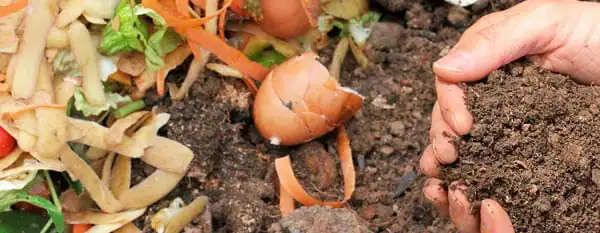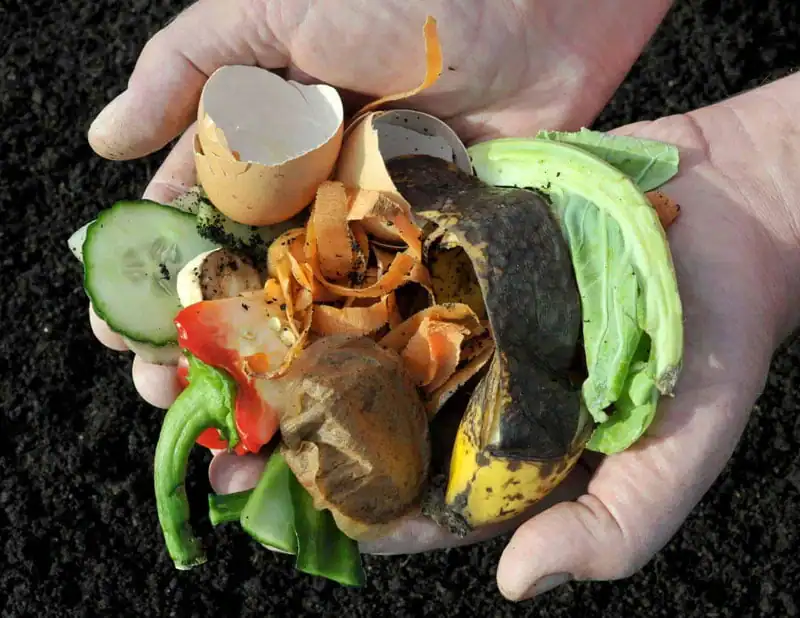Composting is an eco-friendly way to reduce waste and create nutrient-rich soil, and the addition of Epsom salt in compost can help improve the overall quality of the compost. It can also be a naturally improve magnesium levels for all the soil in your yard, instead of individually supplementing trees, lawn and veggie gardens with magnesium.
It is important to point out that you should only add Epsom salt to your compost if the soil around your home is magnesium deficient. Adding Epsom salt to compost can be a holistic and incremental way to distribute magnesium supplementation to all of your soil. However, if you already have sufficient magnesium, adding more can result in too high of a concentration. Before adding supplements to your compost, test your soil first! More about that in the section below.
So how exactly does Epsom salt in compost work? Magnesium is a key nutrient for plant growth, and Epsom salt is a rich source of this mineral. When added to compost, it helps to activate enzymes that break down organic matter, making it easier for microorganisms to digest and decompose. This results in a faster composting process and a higher-quality end product that is rich in essential nutrients.
Does Your Soil Need Magnesium?
In general, the amount of magnesium already in the soil varies depending on where you live. In the United States, soils in the midwest may need very little magnesium supplementation, but soils in areas like eastern Colorado tend to be low in magnesium. See the article Epsom Salts & Wood Ashes from Colorado State University for their evaluation.
The only way that you can know if your garden needs magnesium is to get a soil test. Soil test kits can be fairly affordable, especially when you compare it to the cost of plants that die or don’t thrive. Your local County Extension office or other local agricultural resource boards sometimes make these test kits available at or near cost to encourage good soil management. You can also check with your state’s land grant university for soil testing resources. In Colorado for example, we have Colorado State University that offers many agricultural resources.

What is Epsom Salt?
Epsom salt is a type of salt that is composed of magnesium and sulfate. It is named after the town of Epsom in Surrey, England, where it was first discovered in the springs. The salt has been used for various purposes, including as a bath salt, a soothing agent for muscles, a laxative, and a fertilizer.
Chemical Composition
Epsom salt is a compound made up of magnesium, sulfur, and oxygen. Its chemical formula is MgSO4 · 7H2O. The salt is made by evaporating water from mineral springs that contain high levels of magnesium sulfate.
Magnesium sulfate is a colorless, odorless substance that is highly soluble in water. It is commonly used in medicine as a laxative and in agriculture as a supplement. Magnesium is an essential nutrient for plants, and it plays an important role in photosynthesis, enzyme activation, and the production of chlorophyll.
Sulfur is also an important nutrient for plants, and it is involved in the production of proteins, enzymes, and vitamins. Sulfur is also important for the formation of chlorophyll and for the growth and development of plant roots.
What is Compost?
Compost is a natural process of recycling organic matter into a rich soil amendment that is beneficial for plant growth. It involves the decomposition of organic matter, such as leaves, grass clippings, vegetable scraps, and manure, by microorganisms, such as bacteria, fungi, and worms.
The resulting material, called compost, is a dark, crumbly, and nutrient-rich soil amendment that can be used to improve soil structure, water retention, and plant growth.
Composting Process
The composting process involves four main stages: the initial stage, the active stage, the maturation stage, and the curing stage. During the initial stage, the compost pile is formed by layering organic matter, such as leaves, grass clippings, and vegetable scraps, with a source of nitrogen, such as manure or fertilizer.
The active stage is characterized by the breakdown of organic matter by microorganisms, which produce heat and carbon dioxide. The maturation stage is when the compost stabilizes and becomes more uniform in texture and color. The curing stage is when the compost is allowed to rest and mature before it is used.
Compost Quality
The quality of compost depends on factors such as the source of organic matter, the carbon-to-nitrogen ratio, the moisture content, the temperature, and the microbial activity. Compost that is high in organic matter, nutrients, and microorganisms is considered to be of high quality.
The compost should also be free of pathogens, weed seeds, and contaminants, such as dust and plastic. The texture and appearance of the compost can also indicate its quality, with mature compost being dark, crumbly, and earthy-smelling.
How to Use Epsom Salt in Compost
Adding Epsom salt in compost is easy and can be done in a few simple steps:
- Determine the Amount of Epsom Salt Needed: The amount of Epsom salt needed will depend on the size of the compost pile. As a general rule, use 1 tablespoon of Epsom salt per gallon of water, and apply the solution to the compost pile every 2-4 weeks.
- Dissolve the Epsom Salt: Dissolve the Epsom salt in water before adding it to the compost pile. This will help ensure that the Epsom salt is evenly distributed throughout the compost.
- Add the Epsom Salt Solution to The Compost Pile: Pour the Epsom salt solution over the compost pile, making sure to saturate the entire pile. Use a watering can or hose to apply the solution.
- Turn the Compost Pile: After adding the Epsom salt solution, turn the compost pile to ensure that the Epsom salt is evenly distributed throughout the pile.
The general purpose Epsom salt that I recommend for garden uses is this one:
While Epsom Salt should be Epsom Salt (and you should be able to pick any of them), this is a Epsom Salt for plant nutrition, so this package has lots of useful details on the back of the package about application rates and methods. It also describes how you can use it for a foot soak after you get done taking care of your garden. This is a 7 pound bag.
While Epsom salt in compost can be a beneficial, it should be used only if your soil is known to be deficient in magnesium. Epsom salt should not be confused with being a fertilizer – it does not provide nitrogen, phosphorus, or potassium. It is a supplement.
Can Epsom Salt Be Used in Compost to Benefit Specific Plants?
When it comes to composting, incorporating Epsom salt can have significant advantages for specific plants and crops. Epsom salt offers a valuable source of magnesium and sulfur, essential nutrients for plant growth and development. By introducing Epsom salt in compost, you can enhance its nutrient content and optimize its benefits for specific plant varieties.
Certain plants are particularly responsive to the application of Epsom salt-enriched compost. For instance, magnesium plays a crucial role in chlorophyll production, aiding in photosynthesis and enhancing the overall vigor of leafy greens like lettuce, spinach, and kale.
Crops such as tomatoes, peppers, and roses tend to benefit from the increased magnesium levels provided by Epsom salt if your soil is deficient in this nutrient. Incorporating Epsom salt in compost for specific plants or crops can be a beneficial strategy for gardeners seeking to optimize nutrient uptake, improve growth rates, and enhance overall plant health.
For more detailed articles about specific plants, be sure to see our articles:
- Epsom Salt for Pepper Plants: How To Use It For Premium Peppers
- Epsom Salt For Tomatoes: Maximum Yields With This Natural Supplement
- Epsom Salt for Tree Care: Promoting Stronger and Healthier Trees
Final Thoughts
Epsom salt is a natural and affordable way to improve the quality of compost. By adding it to your compost pile or bin, you can speed up the decomposition process, increase nutrient availability, and enhance soil health.
Research has shown that Epsom salt can help balance the carbon-to-nitrogen ratio in compost, which is crucial for creating a nutrient-rich soil amendment. It can also improve the structure of the compost by breaking down organic matter more efficiently, resulting in a finer, crumbly texture that is easier to handle and spread.
Epsom salt is a safe and effective way to enhance the quality of compost and improve the health of your plants if your soil is deficient in the crucial nutrient magnesium. By incorporating it into your composting routine, you can create a sustainable and eco-friendly garden that thrives for years to come.








